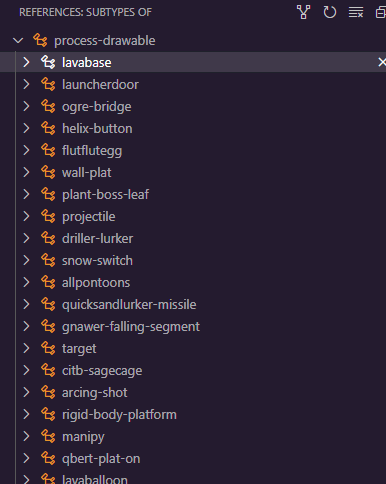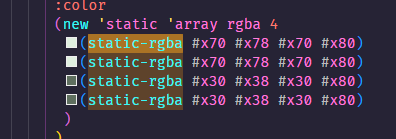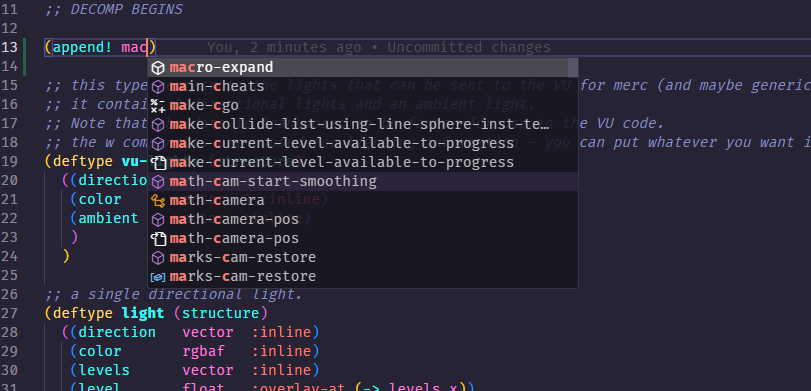mirror of
https://github.com/open-goal/jak-project.git
synced 2024-10-20 11:26:18 -04:00
- Integrate the AST into the LSP, this makes parsing and tokenizing the files much easier - Consolidate most of the symbol info tracking in `goalc` to a single map. Fixed some issues where the old map would never evict symbols when re-compiling files. There is still some more to cleanup, but this now can be used as an incrementally updated source-of-truth for the LSP - re-compile files when they are saved. Ideally this would be done everytime they are changed but that: - may be too aggressive - goalc doesn't compile incrementally yet so it likely would be a worse UX Features added, see https://github.com/open-goal/opengoal-vscode/issues/256 - Hover   - LSP Status fixed - Type Hierarchy  - Document Color  - Document Symbols  - Completions  --------- Co-authored-by: Hat Kid <6624576+Hat-Kid@users.noreply.github.com>
71 lines
2 KiB
C++
71 lines
2 KiB
C++
#pragma once
|
|
|
|
#include <iterator>
|
|
|
|
/*!
|
|
* A Range is similar to a Python range. It can represent an empty range or a range of consecutive
|
|
* values. It supports iterators so you can write a loop like:
|
|
* for (auto x : Range<int>(1, 4)) {
|
|
* }
|
|
* and it will work like you expect, without allocating memory for all the elements.
|
|
*
|
|
* A Range's iterator actually store values, not references, so this is designed to be used
|
|
* with small things, like integers.
|
|
*
|
|
* Note - for size and iterator distances, a Range will use the same type as its elements.
|
|
*/
|
|
template <typename T>
|
|
class Range {
|
|
public:
|
|
Range() = default;
|
|
Range(const T& start, const T& end) : m_start(start), m_end(end) {}
|
|
const T& first() const { return m_start; }
|
|
const T& last() const { return m_end; }
|
|
T& first() { return m_start; }
|
|
T& last() { return m_end; }
|
|
bool contains(T& val) const { return val >= m_start && val < m_end; }
|
|
bool empty() const { return m_end <= m_start; }
|
|
T size() const { return m_end - m_start; }
|
|
bool operator==(const Range<T>& other) const {
|
|
return m_start == other.m_start && m_end == other.m_end;
|
|
}
|
|
bool operator!=(const Range<T>& other) const { return !((*this) == other); }
|
|
|
|
struct Iterator {
|
|
using iterator_category = std::input_iterator_tag;
|
|
using difference_type = T;
|
|
using value_type = T;
|
|
using pointer = const T*;
|
|
using reference = const T&;
|
|
|
|
Iterator(const T& val) : m_val(val) {}
|
|
|
|
reference operator*() const { return m_val; }
|
|
pointer operator->() { return &m_val; }
|
|
|
|
Iterator& operator++() {
|
|
m_val++;
|
|
return *this;
|
|
}
|
|
|
|
const Iterator operator++(int) {
|
|
Iterator old = *this;
|
|
++(*this);
|
|
return old;
|
|
}
|
|
|
|
friend bool operator==(const Iterator& a, const Iterator& b) { return a.m_val == b.m_val; }
|
|
friend bool operator!=(const Iterator& a, const Iterator& b) { return a.m_val != b.m_val; }
|
|
|
|
private:
|
|
T m_val;
|
|
};
|
|
|
|
Iterator begin() { return Iterator(m_start); }
|
|
Iterator end() { return Iterator(m_end); }
|
|
|
|
private:
|
|
T m_start = {};
|
|
T m_end = {};
|
|
};
|